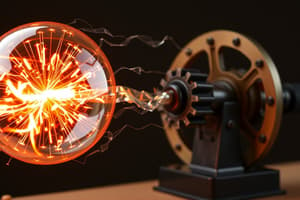Podcast
Questions and Answers
The capacity to do work is known as?
The capacity to do work is known as?
Energy
What is stored energy known as?
What is stored energy known as?
Potential energy
What type of energy is known as the energy of motion?
What type of energy is known as the energy of motion?
Kinetic energy
Energy stored in chemical bonds is called?
Energy stored in chemical bonds is called?
Glucose is stored in the liver and muscles in the form of a polymer called?
Glucose is stored in the liver and muscles in the form of a polymer called?
Which of the following are forms of kinetic energy?
Which of the following are forms of kinetic energy?
The propagation of an impulse in a neuron is an example of what type of energy?
The propagation of an impulse in a neuron is an example of what type of energy?
The vibrating strings on a violin imports ___ kinetic energy to the air around it.
The vibrating strings on a violin imports ___ kinetic energy to the air around it.
Ultraviolet light, radio waves, and visible light are examples of what?
Ultraviolet light, radio waves, and visible light are examples of what?
Which color of visible light has the shortest wavelength?
Which color of visible light has the shortest wavelength?
Heat energy is usually available to do work.
Heat energy is usually available to do work.
Temperature is the measurement of what kind of energy?
Temperature is the measurement of what kind of energy?
The study of energy transformation is known as?
The study of energy transformation is known as?
The ___ law of thermodynamics states that energy can neither be created nor destroyed.
The ___ law of thermodynamics states that energy can neither be created nor destroyed.
If 100% of the energy was to be transferred from one form to another with no generation of heat, the heat ____ law of thermodynamics would be violated.
If 100% of the energy was to be transferred from one form to another with no generation of heat, the heat ____ law of thermodynamics would be violated.
Radiant energy is a form of electromagnetic waves and is a type of kinetic energy.
Radiant energy is a form of electromagnetic waves and is a type of kinetic energy.
The ___ law of thermodynamics states that a quantity of energy can't be completely transferred from one form into another.
The ___ law of thermodynamics states that a quantity of energy can't be completely transferred from one form into another.
The energy required to break existing chemical bonds in reactants is called the ___ energy.
The energy required to break existing chemical bonds in reactants is called the ___ energy.
Which processes are involved in a chemical reaction?
Which processes are involved in a chemical reaction?
In a chemical equation the ___ are written on the left and the ___ are written on the right.
In a chemical equation the ___ are written on the left and the ___ are written on the right.
___ are present prior to the start of a chemical reaction.
___ are present prior to the start of a chemical reaction.
What type of reaction is represented by A+B->AB?
What type of reaction is represented by A+B->AB?
Which criteria can be used for classifying chemical reactions?
Which criteria can be used for classifying chemical reactions?
What is a large molecule that is broken down into smaller chemical structures called?
What is a large molecule that is broken down into smaller chemical structures called?
All the decomposition reactions in an organism are called?
All the decomposition reactions in an organism are called?
What type of reaction results when small molecules combine to make a large one?
What type of reaction results when small molecules combine to make a large one?
___ is the collective term for all the synthesis reactions in the body.
___ is the collective term for all the synthesis reactions in the body.
A chemical reaction that involves both decomposition and synthesis is called a ___ reaction.
A chemical reaction that involves both decomposition and synthesis is called a ___ reaction.
What type of reaction involves the transfer of electrons from one reactant to another?
What type of reaction involves the transfer of electrons from one reactant to another?
If an electron and a hydrogen ion are removed from a structure during a chemical reaction, the structure is said to have been ___
If an electron and a hydrogen ion are removed from a structure during a chemical reaction, the structure is said to have been ___
When a molecule or ion gains an electron during a reaction, it is said to have been ______.
When a molecule or ion gains an electron during a reaction, it is said to have been ______.
In the mnemonic 'LEO says GER', what does 'GER' stand for?
In the mnemonic 'LEO says GER', what does 'GER' stand for?
The reaction picture is a ___ reaction.
The reaction picture is a ___ reaction.
Most catabolic reactions release energy meaning that they are also ________________.
Most catabolic reactions release energy meaning that they are also ________________.
Most anabolic reactions are also ______ meaning that they require energy.
Most anabolic reactions are also ______ meaning that they require energy.
If the rate of a reaction leads to a net loss of reactants, then the reaction is considered?
If the rate of a reaction leads to a net loss of reactants, then the reaction is considered?
The reaction A+B—>AB is a ___ reaction.
The reaction A+B—>AB is a ___ reaction.
If over time, products and reactants are formed at the same rate, then the reaction is said to be?
If over time, products and reactants are formed at the same rate, then the reaction is said to be?
A double-ended arrow in a reaction indicates that the reaction is __?
A double-ended arrow in a reaction indicates that the reaction is __?
The measure of how quickly a chemical reaction takes place is known as the reaction __?
The measure of how quickly a chemical reaction takes place is known as the reaction __?
__ are formed during a chemical reaction.
__ are formed during a chemical reaction.
A ___ chemical reaction occurs when a large molecule is broken down into smaller structures.
A ___ chemical reaction occurs when a large molecule is broken down into smaller structures.
Which terms can be used to classify reactions based on the relative amounts of energy in reactants and products?
Which terms can be used to classify reactions based on the relative amounts of energy in reactants and products?
In an __ reaction, the amount of energy in the products is less than the amount of energy in the reactants.
In an __ reaction, the amount of energy in the products is less than the amount of energy in the reactants.
Put the four basic stages of glucose oxidation in order from first to last.
Put the four basic stages of glucose oxidation in order from first to last.
What is cellular respiration?
What is cellular respiration?
In aerobic respiration, the ATP production method requiring oxygen is known as?
In aerobic respiration, the ATP production method requiring oxygen is known as?
Which are true of an enzyme?
Which are true of an enzyme?
Which of the following are locations of enzymes involved in glucose oxidation?
Which of the following are locations of enzymes involved in glucose oxidation?
What is the chemical equation for glucose oxidation?
What is the chemical equation for glucose oxidation?
If the cofactor is an organic molecule, it is called a?
If the cofactor is an organic molecule, it is called a?
Most enzymes are __ proteins that range in size from 60 to 2500 amino acids.
Most enzymes are __ proteins that range in size from 60 to 2500 amino acids.
Flashcards are hidden until you start studying
Study Notes
Energy Concepts
- Energy is the capacity to do work, existing in various forms such as potential and kinetic energy.
- Potential energy refers to stored energy, while kinetic energy is the energy of motion.
- Chemical energy is specifically the energy stored within chemical bonds.
Forms of Kinetic Energy
- Types of kinetic energy include mechanical, radiant, electrical, thermal, and sound.
- Electrical energy is exemplified by impulse propagation in neurons.
- Sound energy is generated by vibrating objects, transferring kinetic energy to air.
Radiant Energy and Visible Light
- Radiant energy encompasses ultraviolet light, radio waves, and visible light.
- Among visible light, violet has the shortest wavelength.
Thermodynamics
- Thermodynamics is the study of energy transformations.
- The first law states that energy cannot be created or destroyed, only transformed.
- The second law indicates that not all energy can be perfectly converted between forms, leading to heat loss.
Chemical Reactions
- Reactants are substances present prior to a chemical reaction, while products are formed during it.
- Chemical reactions can be classified as synthesis (A + B → AB), decomposition (breaking down large molecules), or exchange (involving both decomposition and synthesis).
- Catabolism refers to all decomposition reactions, while anabolism refers to all synthesis reactions in the body.
Oxidation and Reduction Reactions
- Oxidation-reduction (redox) reactions involve electron transfer; removal of electrons results in oxidation, while gaining electrons results in reduction.
- The mnemonic "LEO says GER" stands for "Lose Electrons is Oxidized" and "Gain Electrons is Reduced."
Reaction Energetics
- Exergonic reactions release energy, while endergonic reactions require energy input.
- A reaction is considered irreversible if it leads to a net loss of reactants and reversible if reactants and products are formed at the same rate.
Rate of Reactions
- The rate of a chemical reaction measures how quickly reactants are converted to products.
- Classification of reactions can be based on energy changes: exergonic (energy in products is less) and endergonic (more energy in products).
Glucose Oxidation and Cellular Respiration
- Glucose oxidation follows stages: glycolysis, intermediate stage, citric acid cycle, and electron transport system.
- Cellular respiration breaks down organic molecules like glucose to extract energy in the form of ATP.
Enzymes in Biochemical Reactions
- Enzymes are catalysts that reduce activation energy and increase reaction rates, primarily located in the mitochondria and cytosol.
- Most enzymes are globular proteins with sizes ranging from 60 to 2500 amino acids.
- Coenzymes are organic molecules that serve as cofactors for enzyme activity.
Chemical Equation for Glucose Oxidation
- The reaction depicting glucose oxidation is C6H12O6 + 6O2 → 6CO2 + 6H2O, illustrating the conversion of glucose and oxygen into carbon dioxide and water.
Studying That Suits You
Use AI to generate personalized quizzes and flashcards to suit your learning preferences.




